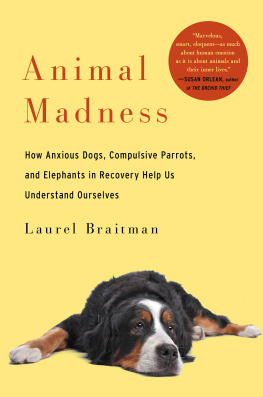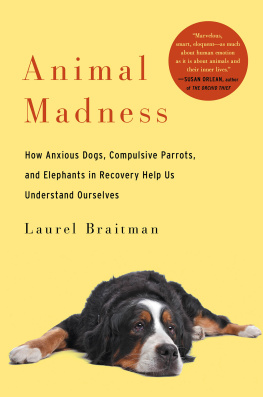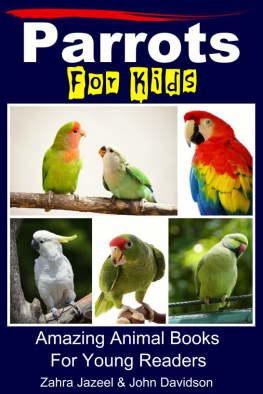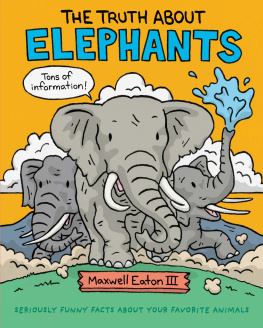Laurel Braitman - Animal Madness: how anxious dogs, compulsive parrots, and elephants in recovery help us understand ourselves
Here you can read online Laurel Braitman - Animal Madness: how anxious dogs, compulsive parrots, and elephants in recovery help us understand ourselves full text of the book (entire story) in english for free. Download pdf and epub, get meaning, cover and reviews about this ebook. year: 2014, genre: Science. Description of the work, (preface) as well as reviews are available. Best literature library LitArk.com created for fans of good reading and offers a wide selection of genres:
Romance novel
Science fiction
Adventure
Detective
Science
History
Home and family
Prose
Art
Politics
Computer
Non-fiction
Religion
Business
Children
Humor
Choose a favorite category and find really read worthwhile books. Enjoy immersion in the world of imagination, feel the emotions of the characters or learn something new for yourself, make an fascinating discovery.
- Book:Animal Madness: how anxious dogs, compulsive parrots, and elephants in recovery help us understand ourselves
- Author:
- Genre:
- Year:2014
- Rating:3 / 5
- Favourites:Add to favourites
- Your mark:
- 60
- 1
- 2
- 3
- 4
- 5
Animal Madness: how anxious dogs, compulsive parrots, and elephants in recovery help us understand ourselves: summary, description and annotation
We offer to read an annotation, description, summary or preface (depends on what the author of the book "Animal Madness: how anxious dogs, compulsive parrots, and elephants in recovery help us understand ourselves" wrote himself). If you haven't found the necessary information about the book — write in the comments, we will try to find it.
Laurel Braitman: author's other books
Who wrote Animal Madness: how anxious dogs, compulsive parrots, and elephants in recovery help us understand ourselves? Find out the surname, the name of the author of the book and a list of all author's works by series.
Animal Madness: how anxious dogs, compulsive parrots, and elephants in recovery help us understand ourselves — read online for free the complete book (whole text) full work
Below is the text of the book, divided by pages. System saving the place of the last page read, allows you to conveniently read the book "Animal Madness: how anxious dogs, compulsive parrots, and elephants in recovery help us understand ourselves" online for free, without having to search again every time where you left off. Put a bookmark, and you can go to the page where you finished reading at any time.
Font size:
Interval:
Bookmark:
Thank you for downloading this Simon & Schuster eBook.
Join our mailing list and get updates on new releases, deals, bonus content and other great books from Simon & Schuster.
C LICK H ERE T O S IGN U P
or visit us online to sign up at
eBookNews.SimonandSchuster.com
We hope you enjoyed reading this Simon & Schuster eBook.
Join our mailing list and get updates on new releases, deals, bonus content and other great books from Simon & Schuster.
C LICK H ERE T O S IGN U P
or visit us online to sign up at
eBookNews.SimonandSchuster.com


Simon & Schuster
1230 Avenue of the Americas
New York, NY 10020
www.SimonandSchuster.com
Note: Certain names and identifying characteristics have been changed.
Copyright 2014 by Laurel Braitman
All rights reserved, including the right to reproduce this book or portions thereof in any form whatsoever. For information, address Simon & Schuster Subsidiary Rights Department, 1230 Avenue of the Americas, New York, NY 10020.
First Simon & Schuster hardcover edition June 2014
SIMON & SCHUSTER and colophon are registered trademarks of Simon & Schuster, Inc.
The Simon & Schuster Speakers Bureau can bring authors to your live event. For more information or to book an event, contact the Simon & Schuster Speakers Bureau at 1-866-248-3049 or visit our website at www.simonspeakers.com.
Interior design by Ruth Lee-Mui
Jacket design by Rex Bonomelli
Jacket photographs: (front) Bernese Mountain dog Erik lam/Shutterstock; (back) silly macaw Tracy Starr/Shutterstock; elephant Nadezhda Bolotina
Illustrations by Kathleen Henderson, for endpapers and dedication page
Library of Congress Cataloging-in-Publication Data
Braitman, Laurel, author.
Animal madness : how anxious dogs, compulsive parrots, and elephants in recovery help us understand ourselves / Laurel Braitman. First Simon & Schuster hardcover edition.
pagescm
1.Animal behavior.2.Animal psychology.I.Title.
QL751.B68342014
591.5dc2
2014000791
ISBN 978-1-4516-2700-8
ISBN 978-1-4516-2702-2 (ebook)
To all the animals Ive loved before, especially Lynn, Howard, and Dr. Mel

You see a dog growls when its angry, and wags its tail when its pleased. Now I growl when Im pleased and wag my tail when Im angry. Therefore Im mad.
The Cheshire Cat to Alice, in Lewis Carroll, The Annotated Alice
Some day Ill join him right there,
but now hes gone with his shaggy coat,
his bad manners and his cold nose.
Pablo Neruda, A Dog Has Died
Mac, the miniature donkey, can be kind of a jerk. He bats his eyelashes, angles his long furred ears toward you, flatteringly, like TV antennas, and pushes his belly up against your thighs. Then, just as youve grown comfortable with his small, stocky presence, his burro smell of sagebrush and sweet alfalfa, something dark and confusing stirs within him. He stiffens, whips his head back, and bites down hard on the bony part of your shin and doesnt let go. Or he rears to stamp his hooves on your toes, or he kicks his back legs like sharp springs in the direction of your kneecaps or into your actual kneecaps. If this wasnt painful, it would be funny. Mac is, after all, the size of a goat. But because you cant predict when it will happen, he is also a little scary. Mac shifts so suddenly from being affectionate and needy to violent and aggressive, transformations that dont seem to be triggered by anything in particular, that some people have taken to calling him schizo donkey.
I am not one of these people. But I believe that hes disturbed. This, however, is not Macs fault. Not entirely anyway. His mother, a stoic Sardinian miniature donkey, lived on the ranch where I grew up. She died within days of giving birth to Mac, and he was given to me to raise. I was twelve years old and saw this tiny donkey as a living stuffed toy. I spent hours bottle-feeding him and playing with him, until I got distracted by Anne of Green Gables books and my seventh-grade crush, a tan boy who skateboarded behind the local McDonalds. Mac was weaned too quickly, exiled to a corral without a donkey mother to show him the ropesa small, unself-confident creature among indifferent adults. Another donkey may have been fine, but Mac wasnt another donkey. Eventually he began to turn his attacks on himself, biting his own fur off in chunks when he became frustrated or erupting in violent outbursts against people and other animals, outbursts that kept him from receiving the affection he also seemed to crave. Now, more than twenty years later, I know that Macs experience and the disturbing behavior that resulted from it, is far from unique.
Humans arent the only animals to suffer from emotional thunderstorms that make our lives more difficult, and sometimes impossible. Like Charles Darwin, who came to this realization more than a century ago, I believe that nonhuman animals can suffer from mental illnesses that are quite similar to human disorders. I was convinced by the experiences of many creatures I came to know, from Mac to a series of Asian elephants, but none more persuasively than a Bernese Mountain Dog named Oliver that my husband and I adopted. Olivers extreme fear, anxiety, and compulsions cracked open my world and prompted me to investigate whether other animals could be mentally ill. This book is the tale of what I found: the story of my own struggle to help Oliver and the journey it inspired, a search to understand what identifying insanity in other animals might tell us about ourselves.
There isnt a branch of veterinary science, psychology, ethology (the science of animal behavior), neuroscience, or wildlife ecology dedicated to investigating whether animals can be mentally ill. What
Every animal with a mind has the capacity to lose hold of it from time to time. Sometimes the trigger is abuse or mistreatment, but not always. Ive come across depressed and anxious gorillas, compulsive horses, rats, donkeys, and seals, obsessive parrots, self-harming dolphins, and dogs with dementia, many of whom share their exhibits, homes, or habitats with other creatures who dont suffer from the same problems. Ive also gotten to know curious whales, confident bonobos, thrilled elephants, contented tigers, and grateful orangutans. There is plenty of abnormal behavior in the animal world, captive, domestic, and wild, and plenty of evidence of recovery; you simply need to know where and how to find it. Oliver was my guide, even if he was too busy compulsively licking his paws to notice.
Acknowledging parallels between human and other animal mental health is a bit like recognizing capacities for language, tool use, and culture in other creatures. That is, its a blow to the idea that humans are the only animals to feel or express emotion in complex and surprising ways. It is also anthropomorphic, the projection of human emotions, characteristics, and desires onto nonhuman beings or things. We can choose, though, to anthropomorphize well and, by doing so, make more accurate interpretations of animals behavior and emotional lives. Instead of self-centered projection, anthropomorphism can be a recognition of bits and pieces of our human selves in other animals and vice versa.
Identifying mental illness in other creatures and helping them recover also sheds light on our humanity. Our relationships with suffering animals often make us better versions of ourselves, helping us empathize with our dogs, cats, and guinea pigs, turning us into bonobo or gorilla psychiatrists, or inspiring the most dedicated among us to found cat shelters or elephant sanctuaries.
Next pageFont size:
Interval:
Bookmark:
Similar books «Animal Madness: how anxious dogs, compulsive parrots, and elephants in recovery help us understand ourselves»
Look at similar books to Animal Madness: how anxious dogs, compulsive parrots, and elephants in recovery help us understand ourselves. We have selected literature similar in name and meaning in the hope of providing readers with more options to find new, interesting, not yet read works.
Discussion, reviews of the book Animal Madness: how anxious dogs, compulsive parrots, and elephants in recovery help us understand ourselves and just readers' own opinions. Leave your comments, write what you think about the work, its meaning or the main characters. Specify what exactly you liked and what you didn't like, and why you think so.





